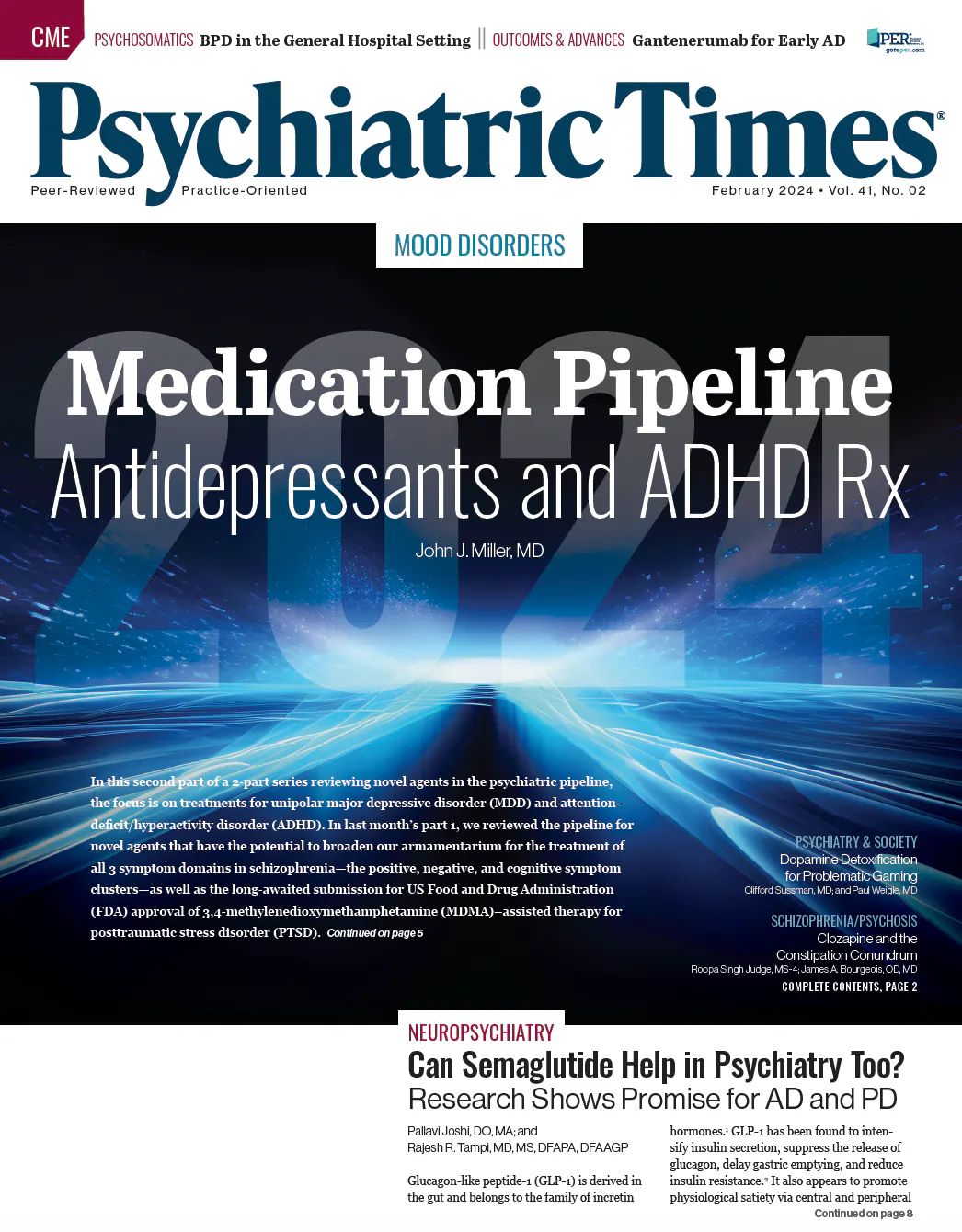From the Pages of Psychiatric Times: February 2024
The experts weighed in on a wide variety of psychiatric issues for the February 2024 issue of Psychiatric Times.

In the February issue of Psychiatric Times®, we worked with experts from multiple psychiatric areas to bring you thoughtful articles about a wide variety of psychiatric topics, from the comorbidity of narcissistic personality disorder and major depressive disorder to the relationship between mass shootings and mental illness. Here are some highlights from the issue.
Mass Shootings’ Relationship to Mental Illness
M-Production/AdobeStock

Nearly a year since our cover story “Changing the Narrative: Mental Illness and Gun Violence,” mass shootings in the United States have continued to dominate the headlines. Publishing its annual report on December 31, 2023, The Trace concluded that 2023 had the second-highest number of mass shootings on record, with 709 individuals killed and at least 2676 injured. The nonprofit research group Gun Violence Archive (GVA) defines a mass shooting as “4 or more shot or killed, not including the shooter.” GVA recorded 656 mass shootings in 2023. This is the second-highest number of mass shootings on record, slightly less than the 689 mass shootings in 2021 and slightly more than the 646 mass shootings in 2022.
The mass shooting in Lewiston, Maine, on October 25, 2023, for example, left 18 dead and 13 injured and has once again brought to national attention the question of what can be done to prevent or minimize future mass shootings. In this instance, based on information reported by the media, it appears that the shooter experienced psychotic symptoms at the time of the shootings and reportedly had been psychiatrically hospitalized for 14 days in July while serving in the US Army Reserve. Continue Reading
Dopamine Detoxification for Problematic Gaming
Taras_Muroslavovuch_AdobeStock

It didn’t work,” Eric’s mother said. “He’s still up all night and won’t go to school in the morning.” Upon learning that Eric, a 16-year-old boy, frequently played Fortnite in his bedroom until 4 am, Eric’s psychiatrist recommended removing the gaming console from his bedroom. “I’m sorry to hear that,” the psychiatrist said. “Do you know what’s keeping him awake now?” Eric’s mother quickly replied, “Sure; now he stays downstairs with the gaming console all night and never sets foot in his bedroom.”
A substantial body of literature demonstrates how excessive habitual video game play can develop into an impairing disorder. Problematic gaming is often recognized in clinical practice but can be challenging to treat. Clinicians can start by educating families on how video games interact with the brain’s reward system, making it difficult for some to disengage. Gaming grants players immediate gratification, mediated by an abnormal surge of dopamine in their neural reward pathway. Continue Reading
Medication Pipeline: Antidepressants and ADHD Rx
petrrgoskov/AdobeStock

In this second part of a 2-part series reviewing novel agents in the psychiatric pipeline, the focus is on treatments for unipolar major depressive disorder (MDD) and attention-deficit/hyperactivity disorder (ADHD). In last month’s part 1, we reviewed the pipeline for novel agents that have the potential to broaden our armamentarium for the treatment of all 3 symptom domains in schizophrenia—the positive, negative, and cognitive symptom clusters—as well as the long-awaited submission for US Food and Drug Administration (FDA) approval of 3,4-methylenedioxymethamphetamine (MDMA)–assisted therapy for posttraumatic stress disorder (PTSD).
Three brain receptors associated with depression may soon see novel agents to expand our current large armamentarium of treatments for MDD: the N-methyl-D-aspartate (NMDA) glutamate receptor, opioid κ receptor (κ-receptor), and serotonin 5-HT2A receptor. MDD continues to challenge even the most skilled clinicians. Much has been written about the high prevalence of partial response or frank treatment resistance for patients experiencing moderate to severe depressive episodes. Continue Reading
Adding Insult to Narcissistic Injury: Comorbidity of Narcissistic Personality Disorder and Major Depressive Disorder
Mary Long_AdobeStock

The comorbidity of personality disorders and serious mental illnesses (SMIs) such as schizophrenia, major depressive disorder (MDD), and bipolar disorder is well documented. This literature primarily focuses on the comorbidity of borderline personality disorder (BPD) and MDD, BPD and bipolar disorder, and antisocial personality disorder and SMI in incarcerated populations. Much less attention has been paid to the comorbidity of narcissistic personality disorder (NPD) and SMI.
NPD is a common condition, with prevalence estimates in clinical samples ranging from 1% to 17%. Individuals with NPD can experience significant impairments in psychosocial and interpersonal functioning. Despite its prevalence and consequences, NPD remains poorly understood. It is one of the least studied personality disorders, with no randomized control treatment studies. Continue Reading
See the full February issue of Psychiatric Times here. And be sure to stay up-to-date by subscribing to the Psychiatric Times E-newsletter.
Do you have a comment on any of these or other articles? Have a good idea for an article and want to write? Interested in sharing your perspectives? Write to us at PTeditor@mmhgroup.com.
